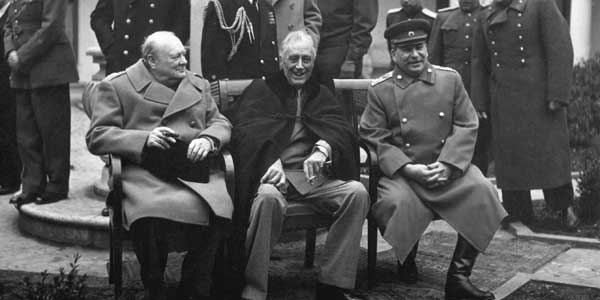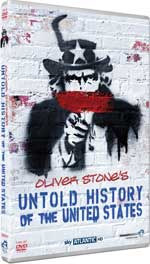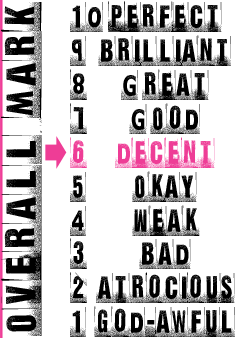
Director: Oliver Stone
Running Time: 600 mins
Certificate: E
Release Date: July 1st 2013

The fact this is ‘Oliver Stone’s’ Untold History Of The United States should give you a hint that this is not a series to toe the party line. Through its 10 episodes, Stone is determined to be as contrarian as possible, often to great effect but sometimes taking things a little too far. To be fair it’s an inevitable by-product of the project, which sets out to give the other side of US history – or at least what Stone seem to think is the other side, even when he’s saying things that most people now agree is true but which he seems to think is hidden knowledge.
Indeed it’s true that little of this is the genuinely ‘untold’ history, as he’s far from the first to suggest the US perhaps didn’t save millions of US lives by dropping the atomic bomb on Japan in World War II, or that US’s support for regime changes in South America and the Middle East has come back to bite them on the ass numerous times. What is unusual is to plonk it all together into one bombastic, rather overblown and hectically edited series, which varies between providing fascinating information, being slightly patronising, seemingly hopelessly one-sided and occasionally feeling like it’s getting successfully getting towards some sort of hidden truth.
The first four episodes concentrate on World War II and its immediate aftermath, before it goes through the Cold War and the fight against Communism, spends plenty of time on Vietnam (which isn’t surprising as Stone fought in that conflict), before chronicling the end of the USSR and coming right up to date with the presidencies of the two George Bushes, Bill Clinton and Barack Obama.
Stone uses a rather extreme version of the ‘great man’ theory of history. His way of doing it is perhaps not surprising for a filmmaker, as he turns the last 70 years into being the result of the actions of heroes and villains – and with this being Oliver Stone, he tends to like suggesting that the people most people say were bad weren’t as awful as has been suggested, while the good guys were actually dreadful. In fact, the overall impression is that America has had to deal with one asshole after another, who have used various ideologies and theories to make a seemingly never ending series of bad decisions born of arrogance and faulty thinking. It gets to the point where when Stone says in the final few minutes he hopes his series can point the way towards a better future that learns from the mistakes of the past, you get the feeling he thinks everything that’s happened since 1945 has been a mistake.
He seems upset the Presidents and other powerful people are actually human, without actually realising that.
He does have heroes though, who Stone bathes in an aura of glory where he treats them as if they could pretty much walk on water. For example he adores Franklin D. Roosevelt, and while he is very critical of JFK’s early presidency, he has nothing bad to say about his last few months in office. However he saves his biggest love for Henry Wallace, a peace-loving man Stone believes should have replaced FDR, but who had the chance of becoming president taken away from him. Throughout the series the filmmaker harks back to the wonders of Wallace, who he believes would have changed the course of US history for the better, from ending WWII sooner (and without atom bombs) to preventing the Cold War. There’s no doubt though that Stone seems to think that if Wallace had become President, we’d be living in some sort of utopia now.
It’s difficult not to notice that the people Stone likes are the ones who never got to do what he thinks they might have. Roosevelt died in office before the Second World War could end, Wallace had the Vice Presidency taken from him so he couldn’t take over when FDR died and JFK was assassinated. It’s here where Stone can’t help but stop telling the Untold History and go into the speculative history of what might have been. He ought to have realised that’s what he was doing, as so much of the rest of the series is about the difference between what people have said they will do and what they believe in, and the reality of what happened.
In fact this is the best aspect of the series, with some great quotes from Presidents and public officials that are directly contradicted by the footage we’re then shown of the results of their actions. The most jaw-dropping is George W. Bush in one of the 2000 Presidential election debates, where he remonstrates Al Gore by saying that he doesn’t believe it’s America’s job to go into other countries and tell them how to live. It’s a two minute summary of Bush 2’s presidency, giving by the man himself before he took office, where he himself says the ideology he ended up following is completely wrong.
And while you might think he’d give the likes of Bill Clinton and Barack Obama a pass, he rips into them too, seeing Clinton as potentially corrupt and doing nothing to deal with American militarism following the end of the Cold War, while Obama is a letdown, who Stone feels has ended up furthering some of the worst of Bush’s policies – both militarily and economically – while doing nothing to bring the hope he promised.
You may also think that as this is an ‘untold history’ there might be room for a look at LGBT people, who get routinely ignored in other histories. However, other than a very occasional mention that gay people were being treated badly, we’re ignored once again – there’s no Stonewall, AIDS crisis or anything else. It’s partly because Stone concentrates on the US on the international stage, but it is a shame.
The series is worth watching, although you do have to keep your eyes wide open as it’s not a documentary where you can take anything at face value. In trying to balance out what Stone sees as a one-sided version of history based on American exceptionalism that we’re usually given, he’s determined to be as far on the other side as possible. It doesn’t vaguely try to be even-handed, which is both frustrating but occasionally allows for moments of real illumination.
You also have to be okay with Stone’s slightly stilted narrative style, the hectic editing and the rather in your face soundtrack, which I’m sure some people will find rather frustrating. To be honest I felt the way it was made was quite effective, but I know a lot of other people have felt different.
Overall Verdict: Interesting, ridiculously one-sided, full of fascinating info but never 100% trustworthy, slightly patronising yet well-meaning. It’s not quite a Untold History and it’s very biased, but there’s enough that new, different and well-argued here to make it worth watching, especially for a slightly different take on the great man theory of history.
Reviewer: Tim Isaac





Leave a Reply (if comment does not appear immediately, it may have been held for moderation)